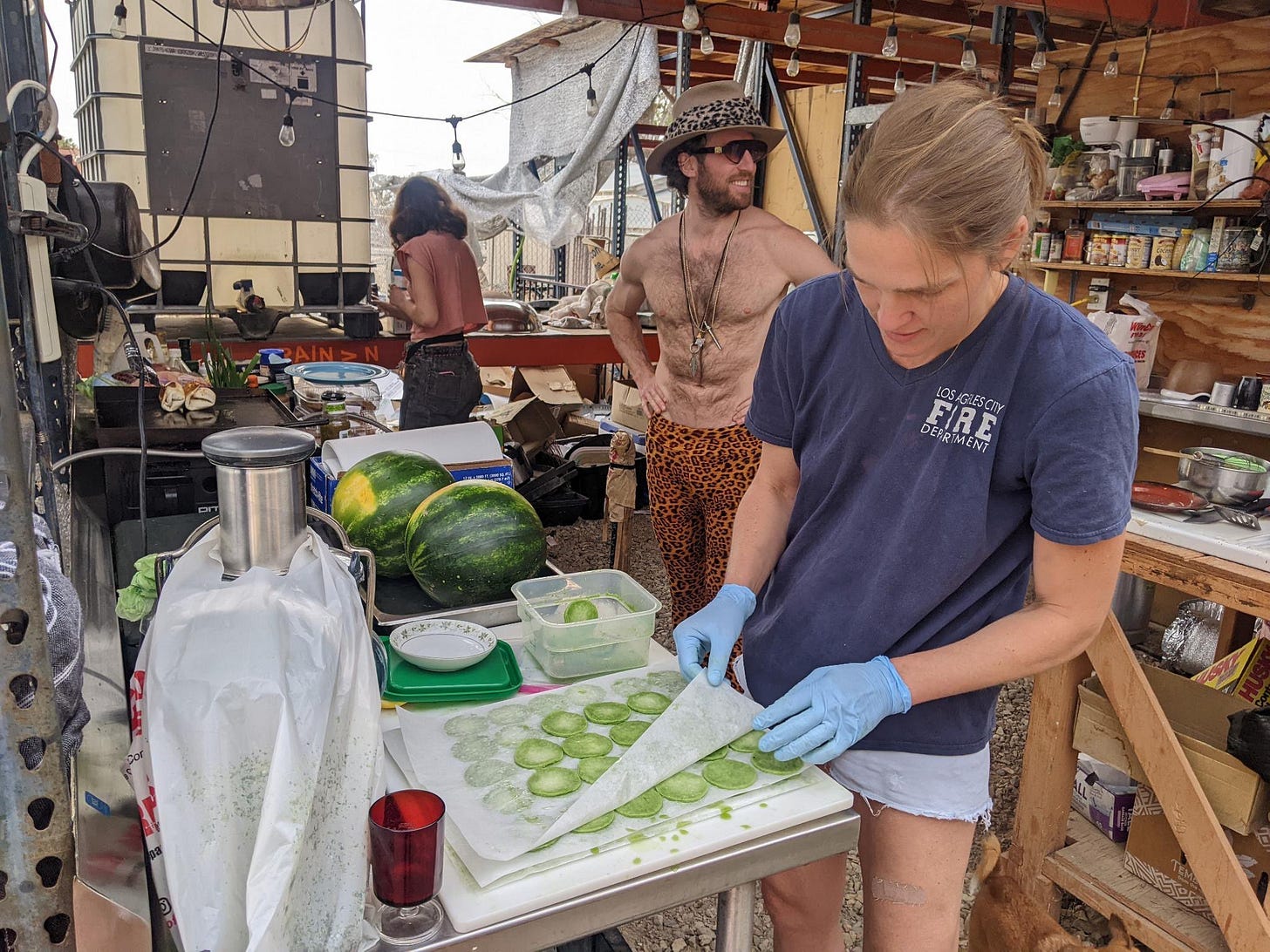Apply to the Culinary Institute of Mars College
Cooking skills are the birthright of every human being. This has been true throughout all of human history, up until the invention of convenience food in America in the 1940s. Before then, every person that was ever born, grew up in a place witnessing the daily activity of food preparation in one way or another. Now we find ourselves upon a precipice. The first generations of human beings who don’t know how to cook.
I am a classically trained chef and I am a martian and I am pleased to announce the inaugural year of the Martian Culinary Academy at Mars College 2024.
The way we grow, package, sell, purchase, prepare and eat food in our society is a broken system. An epidemic of loneliness is growing amongst the populous. Financial well-being is on the decline as we spend more and more money on convenience foods that make us more and more sick. The Martian Culinary Academy seeks to forge a new way. By fixing our food, we will become less lonely, more healthy, and keep more money in our pockets.
The people who get into the culinary industry are like me: they are makers who love taking care of their friends and family and creating positive experiences. What can happen to a chef in the restaurant kitchen, is the loss of this heart-connection with the work: the friends and family in the dining room are replaced with nameless, faceless customers; the fun in spontaneity is all but lost, as the daily inspirations are replaced with the drudgery of the menu.
I envision a new kind of restaurant, where culinary professionals can find what was lost, where a chef becomes also a teacher and also a conductor, and the diners become also collaborators and friends and also cooks…and maybe chefs. Food should nourish us all on a social as well as physical level. The by-product of this program will be a template for culinary professionals to use within their communities, all of whom wish there was another format beside traditional forms of service.
In addition to providing education in culinary fundamentals, The Martian Culinary Academy will be a lab in which to test ideas relating to this vision.
During the weekly Martian Culinary Academy lectures you will develop knowledge of cooking methods including boiling, broiling, braising, stewing, baking, deep frying, pan-frying, grilling, roasting, sautéing, poaching, steaming, simmering, reductions, and sauce preparations. I will define and demonstrate culinary techniques such as de-boning, scaling, filleting, trimming, dicing, slicing, pureeing, piping, trussing, shaping, forming, and emulsifying. You will learn proper use and care for kitchen equipment, how to “think like a chef” in the planning and execution of a menu, how to build harmony and balance flavors, and ways to arrange, garnish and present food.
The extent to which this theoretical knowledge is translated into manual ability will be self-determined based on relative desire and availability; however all Martians in the academy will be fed in part by the program and will participate in the preparation of these meals to meet a minimum time requirement as detailed below.
Attendance at 80% of weekly lectures, including the first week, as well as logging the minimum minutes of practical effort will qualify the student to earn the Martian Culinary Achievement Badge.
If shared Martian curiosity beyond the core curriculum is accompanied by an additional, voluntary commitment of time, then additional lectures, demonstrations, and group activities shall be executed and enjoyed on the following topics: Bread and Pizza, Pastry Basics (quick breads, cookies, pies, meringues), Butchery, Pasta, Pickling and Preserving, Sprouting, Candy Making, and more!
During the first half of the semester, dinner menus will be designed comprehensively around lesson plans on classical technique. The menus will evolve in complexity as skills develop.
As Chef of the Academy, I will be available to all Martians as a resource for planning meals on Mars outside the Academy’s schedule. Radical self-reliance and off-grid, sustainable living remain at the center of the Mars College ethos, and cooking food on Mars will continue to be an exciting challenge. Together, we can explore topics such as root-cellars, solar ovens, large-batch cooking and preserving.
In the second half of the semester, we will add additional modules based on interest expressed by students of the Academy. In other words, we will collaboratively design some of the curriculum.
For example, let’s say someone has a calling in their heart-mind to master the art of pickling. If a few more people are interested, we could agree to spend some time on that. We would then plan meals around showcasing them (e.g., sour-dilled pickles may inspire us to do cheeseburgers deluxe, with brioche buns; pickled daikon radishes may lead to vegetarian futomaki; sauerkraut to sausages; and on and on.)
Is anyone else’s mouth watering yet?
Perhaps a group of students will be especially interested in butchery, and that will lead to lollipop chicken wings, while others will feel drawn to the work of the saucier (the sauce cook) and during the week when butchers are mastering lollipop chicken wings, the sauciers will make a variety of things we can dip them in. Or maybe the sauciers will be too busy making sauces for the fresh-pasta-obsessed cohort.
These are fantasies. The fun of Mars is in being there to witness and be a part of its unfolding. I am interested in teaching anything that anyone wants to learn.
If this sounds like it’s for you we encourage you to apply. Please fill out both the main Mars College application form and the form for the Culinary Institute. Thank you for your interest in the culinary arts.
The deadline to apply is November 12, 2023.
Apply to Mars College!
Apply for the Culinary Institute!
From Catherine








